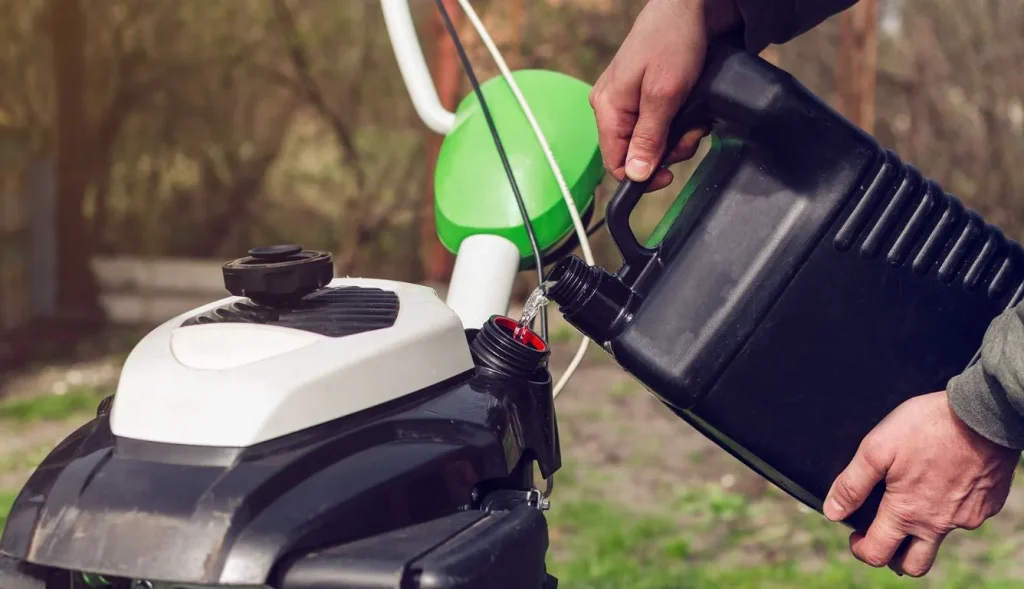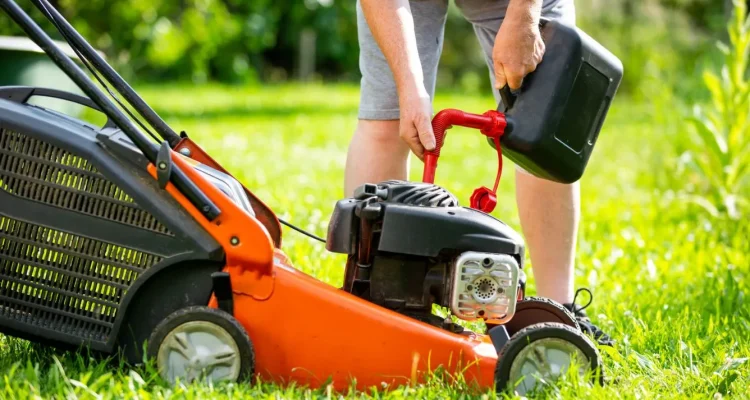Introduction
When it comes to maintaining your lawn mower, one of the most crucial aspects is ensuring you use the right type of gasoline. Using the correct fuel not only ensures optimal performance but also prolongs the life of your lawn mower engine. In this article, we’ll dive into the specifics of what kind of gas a lawn mower takes and why it matters.

Understanding Lawn Mower Engines
Before we get into the types of gasoline, it’s essential to understand the two main types of lawn mower engines: 2-stroke and 4-stroke engines.
Types of Lawn Mower Engines
- 2-Stroke Engines: These engines require a mix of oil and gasoline. They are generally more powerful and lighter but can be less fuel-efficient.
- 4-Stroke Engines: These engines run on pure gasoline and have a separate oil reservoir. They are typically more fuel-efficient and environmentally friendly.
Types of Gasoline for Lawn Mowers
Regular Unleaded Gasoline
Most lawn mowers run perfectly on regular unleaded gasoline with an octane rating of 87. It’s readily available and typically recommended by manufacturers.
Premium Gasoline
Premium gasoline has a higher octane rating (usually 91 or higher). While it’s more expensive, it’s not necessarily better for your lawn mower unless specifically recommended by the manufacturer.
Ethanol-Blended Gasoline
Many gas stations offer gasoline with ethanol, which is a type of alcohol made from corn or other plant materials. While small amounts of ethanol (up to 10%, known as E10) are generally safe for most lawn mowers, higher concentrations can cause engine problems.
Octane Rating and Lawn Mowers
The octane rating measures a fuel’s ability to resist knocking or pinging during combustion. For most lawn mowers, an octane rating of 87 (regular unleaded) is sufficient. Using a higher octane fuel than recommended does not improve performance and is not cost-effective.
Ethanol in Gasoline
Ethanol can attract moisture, leading to corrosion and other engine issues. It’s best to avoid gasoline with more than 10% ethanol (E10). Some manufacturers even recommend using ethanol-free gasoline when possible.
Alternative Fuel Options
While gasoline is the most common fuel for lawn mowers, there are alternative options available:
Propane
Propane-powered lawn mowers are an eco-friendly option. They produce fewer emissions and can be more cost-effective in the long run.
Natural Gas
Similar to propane, natural gas is cleaner than gasoline but requires a conversion kit and access to a natural gas supply.
Battery-Powered Lawn Mowers
While not using gasoline, battery-powered lawn mowers are becoming increasingly popular. They are quiet, produce zero emissions, and require less maintenance.
Choosing the Right Gasoline
When selecting gasoline for your lawn mower, consider the following:
- Manufacturer Recommendations: Always check your lawn mower’s manual for the recommended type of gasoline.
- Ethanol Content: Opt for ethanol-free gasoline or one with no more than 10% ethanol (E10).
- Freshness: Use fresh gasoline, as old gas can degrade and cause engine issues.
Mixing Oil with Gas for 2-Stroke Engines
For 2-stroke engines, mixing the correct ratio of oil and gasoline is crucial. The typical ratio is 50:1 (50 parts gasoline to 1 part oil). Always refer to your lawn mower’s manual for the precise ratio.
Storing Gasoline for Lawn Mowers
Proper storage of gasoline ensures it remains effective and safe to use:
- Storage Containers: Use approved gas containers.
- Cool, Dry Place: Store gasoline in a cool, dry place away from direct sunlight and heat sources.
- Shelf Life: Gasoline has a shelf life of about 3-6 months. Add a fuel stabilizer if you need to store it longer.
Signs of Using the Wrong Gasoline
Using the wrong type of gasoline can cause several issues:
- Poor Performance: The engine might run roughly or stall frequently.
- Hard Starting: Difficulty starting the lawn mower.
- Increased Emissions: More smoke or unusual exhaust emissions.
Maintenance Tips for Lawn Mower Engines
Regular maintenance can prevent many fuel-related issues:
- Oil Changes: Regularly change the oil (for 4-stroke engines).
- Air Filter: Keep the air filter clean.
- Spark Plug: Check and replace the spark plug as needed.
- Fuel System: Clean the fuel system periodically.
Environmental Considerations
Gasoline-powered lawn mowers contribute to environmental pollution. Consider these eco-friendly options:
- Electric Mowers: Battery-powered or corded electric mowers.
- Propane Mowers: Emit fewer pollutants.
- Manual Reel Mowers: No fuel required and completely eco-friendly.
Common Myths About Lawn Mower Fuel
There are several myths about lawn mower fuel that need debunking:
- Premium Gas is Better: Not necessarily. Stick to the manufacturer’s recommendation.
- Ethanol Gas is Always Bad: Small amounts (up to E10) are usually fine, but avoid higher ethanol blends.
- Old Gas is Safe to Use: Old gasoline can cause performance issues and should be avoided.
Safety Tips When Handling Gasoline
Handling gasoline safely is crucial to prevent accidents:
- Avoid Spills: Use a funnel to avoid spills when filling the tank.
- Proper Storage: Store gasoline in approved containers and keep them tightly closed.
- Fire Safety: Keep gasoline away from open flames and sparks.
FAQs
What type of gas should I use for my lawn mower?
Use regular unleaded gasoline with an octane rating of 87, unless your lawn mower’s manual specifies otherwise.
Can I use premium gas in my lawn mower?
Premium gas is not necessary unless recommended by the manufacturer. Regular unleaded gasoline is usually sufficient.
How do I know if my lawn mower needs gas mixed with oil?
If you have a 2-stroke engine, it requires a mixture of oil and gasoline. Check your manual for the correct ratio.
What happens if I use gas with too much ethanol?
Using gasoline with more than 10% ethanol can lead to engine problems, including corrosion and poor performance.
How can I make my lawn mower more environmentally friendly?
Consider using propane or battery-powered lawn mowers, and ensure regular maintenance to reduce emissions.
Conclusion
Choosing the right gasoline for your lawn mower is essential for maintaining its performance and longevity. Always refer to your lawn mower’s manual, use fresh gasoline with the appropriate octane rating, and avoid high ethanol blends. Regular maintenance and considering eco-friendly alternatives can also help in making your lawn care routine more efficient and environmentally friendly.


Congratulation!